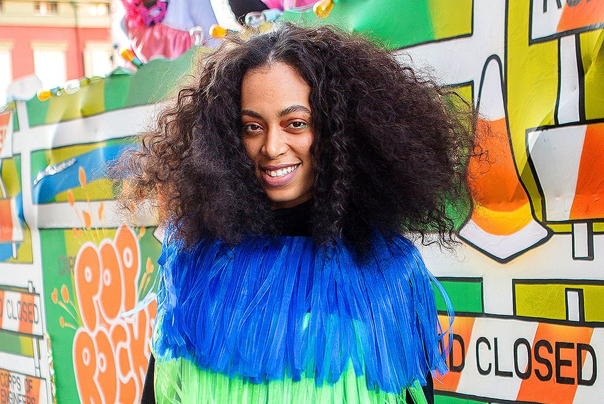
Last year was a breakout year for Solange (full name Solange Knowles). Beyond breaking out on the scene with a universally loved and critically acclaimed album, she also, in some small sense, broke out from under her older sister's shadow...a slightly more well-known Knowles named Beyoncé. This was not her first record by any means - her debut came when she was only 14 years old. Like Beyoncé, she was managed early on by their father, and made numerous appearances as a guest on soundtracks, commercials, other people's songs (such as her sister's Destiny Child group), and did some acting as well. Her career as a solo artist has been a steady climb, but this year's album, A Seat at the Table, brought her her first number one album in her career, and made her and Beyoncé the first sisters to ever have separate number one albums in one year.
Another thing that linked the sisters last year was their increased political involvement, becoming outspoken, powerful voices for black lives (specifically black women) in what some have called the "second civil rights movement". Solange's politics were less of a new thing to the public than her sister's. She went from straightened hair to afro styles starting in 2014 as a statement of black femininity, and in 2015, at an HBO event, performed a new protest song ("Rise") that would eventually be the first track on A Seat at the Table. The song was inspired by the police killings in Ferguson and Baltimore, and she performed it at a number of protests after its debut. It was definitely a sign of things to come on the new album, setting the tone for a record of, as she describes it, "a project on identity, empowerment, independence, grief and healing." (Pitchfork, 9/27/16). Featuring powerful interludes by her father and rapper/producer/CEO Master P reflecting on racial politics, she and co-producer Raphael Saadiq joined forces to create music with a throwback, soulful feel of early 70's funk, a fitting backdrop to the black power movement of then and now. "Cranes in the Sky" is a poignant song about the unavoidable racism and misogyny that black women regulary face in the US. Despite its dark subject matter, it feels uplifting, ultimately, as Solange's beautiful vocal calls for action rather than avoidance, and suggests the possibility of overcoming the struggle. In the context of the rest of the album, it seems as if Solange has clearly met the challenges of black femininity head-on and is not backing down.